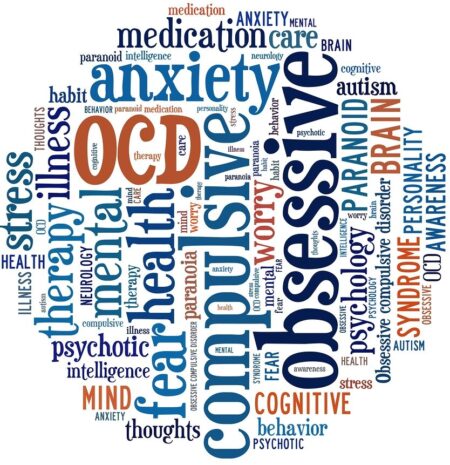
Are these worries that I’m having genuine concerns or is it just my OCD?
This question may sound familiar if you or a loved one has wrestled with obsessive thoughts. This is a great and understandable question, but the answer doesn’t actually matter. If you’re thinking, “but of course it matters,” hopefully the following will help explain why we don’t have to answer this question and still be able to move forward in our lives.
It’s also important to note that this great question means we are paying attention to our thoughts with some curiosity instead of getting swept up without even questioning them. However, it does not actually matter because it is less about the topic or content and more about the function of the thought and how we respond to it. “What do you mean the function and how I respond to it?” If you are willing to get nerdy on some psychology with me here, read on.
How we respond to an unwanted thought, image, or sensation and the resulting distress is more important than the content of the thought, image, or sensation. A thought is just a thought until we apply meaning to it. Different meanings often get different responses. For example, if a distressing thought pops up, my mind might say “hey this just made me feel really uncomfortable which means it should be investigated. I should pay special attention to it.” I’m not suggesting that we shouldn’t feel distressed at a distressing thought but rather that we have a choice in what we do when we are feeling distressed about uncertainty. This concept applies whether someone is struggling with a genuine worry about making new friends or unwanted obsessional thoughts about whether they are in the right relationship, truly religious, a good mother, contaminated, and so on. Therefore, the question “Is this me or OCD?” does not always have to be answered. A better question to ask might be “how does spending time trying to figure out whether this is OCD or not help me get closer to the type of living I want to do?”.
Whether it is an OCD thought or not, there are a few concepts to consider.
- What function is this thought, image, sensation serving?
In other words, is this thought trying to find certainty about something that may have happened, is it trying to gain control over something that I am not in control of, is it trying to prepare me for a feared outcome, is this image making me fearful, is the sensation causing me to avoid certain places or people, is this image pushing me to try and stop thinking about it? Keep in mind that I am not asking “Why am I having this thought/image/sensation?” Rather, what happens once these thoughts/images/sensations show up? If you notice that responding to these thoughts keeps you stuck, consider how acknowledging their presence but not trying to gain certainty might get you back on track with your life.
- How can I respond to this thought in a way that aligns with my values?
If someone is trying to figure out whether an unwanted thought/image/sensation is OCD or something else, how does that bring them closer to what is important in their life? Does knowing bring more connection with loved ones? Does knowing create a greater sense of purpose or deepen your spiritual/religious practice? And one might argue “but if I can be certain that it is just an OCD thought, then I know it’s not really me.” I have no argument there because knowing might make someone feel better, but what happens when the next one shows up? Do you have to figure out if that one is or isn’t OCD too? And just like that, we are back in the cycle of engaging in repeated mental checking (which is a compulsion) to manage uncertainty.
- If paying attention to this thought/image/sensation does not bring me closer to what is important to me, can I practice responding differently?
This is where ERP (Exposure and Response Prevention) and ACT (Acceptance and Commitment Therapy) come into the picture. Through practice we can learn how to notice our initial reactions to these thoughts/images/sensations while choosing how to respond to them with more flexibility. Instead of getting stuck on trying to figure out where they came from or how to get rid of or fix them, we can allow them to come and go like bad commercials on the television. Keep in mind, you are already living with uncertainty and allowing thoughts/images/sensations to come and go on their own (like I bet you haven’t looked to see if there is a spider crawling above you right now and yet you’ve been okay without knowing that, unless you just looked and now you know). You can learn to do the same even when these thoughts/images/sensations feel so real or so important. With practice, motivation, and willingness to get comfortable with discomfort, you don’t have to let your thoughts control you.
Finally, I would be remiss to not point out that it is common to obsess about obsessions. If we break down the key components that maintain the cycle of OCD, we have 1) triggers, 2) obsessions, and 3) compulsions. If we look closely at the question being discussed here, we find the very same chain of triggers (having a thought/sensation/urge), obsessions (feeling uncertain whether this is OCD which makes us uncomfortable), and compulsions (feeling like we have to figure this out so we can feel certain that it’s one or the other). I recognize that someone reading this right now might be thinking “but if I can’t figure it out, something seriously bad could happen.” When we are held hostage by scary hypotheticals, and it feels too scary to handle alone, it can be immensely helpful to start challenging these fears with the help of a trained professional who specializes in the treatment of OCD.
Some take away points:
- Trying to figure out whether a thought/sensation/urge/image is OCD or not can become a mental compulsion cycle (which leads to more obsessions) in of itself and does not typically help us stay engaged with our lives.
- Understanding how you respond to a thought/image/sensation will give you more valuable information than figuring out why it is showing up or where it came from.
- You can go towards the things that are important to you even if those thoughts/images/sensations tag along.
- You are not your thoughts, but rather the observer of them.
Face your fears. Live with uncertainty. Take control of your life.
Dr. John Mohammadioun, is a Licensed Psychologist specializing in the assessment and treatment of anxiety disorders and OCD with children, adolescents, and adults.

